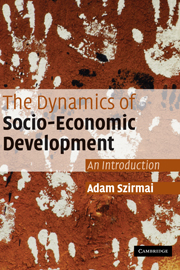Book contents
- Frontmatter
- Contents
- List of figures
- List of tables
- List of boxes
- Preface
- List of abbreviations
- Acknowledgements
- Chapter 1 Developing countries and the concept of development
- Chapter 2 Development of the international economic order, 1450–2000
- Chapter 3 Growth and stagnation: theories and experiences
- Chapter 4 Technology and development
- Chapter 5 Population and development
- Chapter 6 Health, health care and development
- Chapter 7 Education and development
- Chapter 8 Economic development, structural transformation and primary exports
- Chapter 9 Industrial development
- Chapter 10 Agricultural development and rural development
- Chapter 11 State formation and political aspects of development
- Chapter 12 Cultural dimensions of development
- Chapter 13 The international economic and political order since 1945
- Chapter 14 Foreign aid and development
- Bibliography
- Author index
- Subject index
Chapter 7 - Education and development
Published online by Cambridge University Press: 05 June 2012
- Frontmatter
- Contents
- List of figures
- List of tables
- List of boxes
- Preface
- List of abbreviations
- Acknowledgements
- Chapter 1 Developing countries and the concept of development
- Chapter 2 Development of the international economic order, 1450–2000
- Chapter 3 Growth and stagnation: theories and experiences
- Chapter 4 Technology and development
- Chapter 5 Population and development
- Chapter 6 Health, health care and development
- Chapter 7 Education and development
- Chapter 8 Economic development, structural transformation and primary exports
- Chapter 9 Industrial development
- Chapter 10 Agricultural development and rural development
- Chapter 11 State formation and political aspects of development
- Chapter 12 Cultural dimensions of development
- Chapter 13 The international economic and political order since 1945
- Chapter 14 Foreign aid and development
- Bibliography
- Author index
- Subject index
Summary
Like health, education is both an end and a means. It is one of the basic human rights and a developmental goal in its own right. But, education also contributes to the realisation of other important developmental goals (UNESCO, 2002). Functions and tasks generally ascribed to education include the following:
Promotion of economic growth and development. Investment in the physical capital stock is not sufficient for economic development. Investment in ‘human capital’ is also required.
Modernisation of attitudes and mentalities in society.
Contributing to important developmental goals such as increased life expectancy, improved health and reduced fertility. Education of mothers, in particular, makes important contributions to better health of children and reductions in fertility. These are among the important non-economic benefits of education. These relationships have been discussed in the chapters on population and health (Chapters 5 and 6).
Political socialisation, promotion of a sense of civic responsibility, contributing to national integration and national political consciousness in developing countries.
Reducing social and gender inequality and increasing social mobility.
Contributing to personal growth, development and emancipation.
Immediately after World War II, expectations concerning the role of education in development were high. Expansion and improvement of education were generally considered as essential to development. Governments in developing countries were prepared to invest heavily in education. Families saw education as the main way to improve their children's chances in life.
- Type
- Chapter
- Information
- The Dynamics of Socio-Economic DevelopmentAn Introduction, pp. 213 - 254Publisher: Cambridge University PressPrint publication year: 2005

